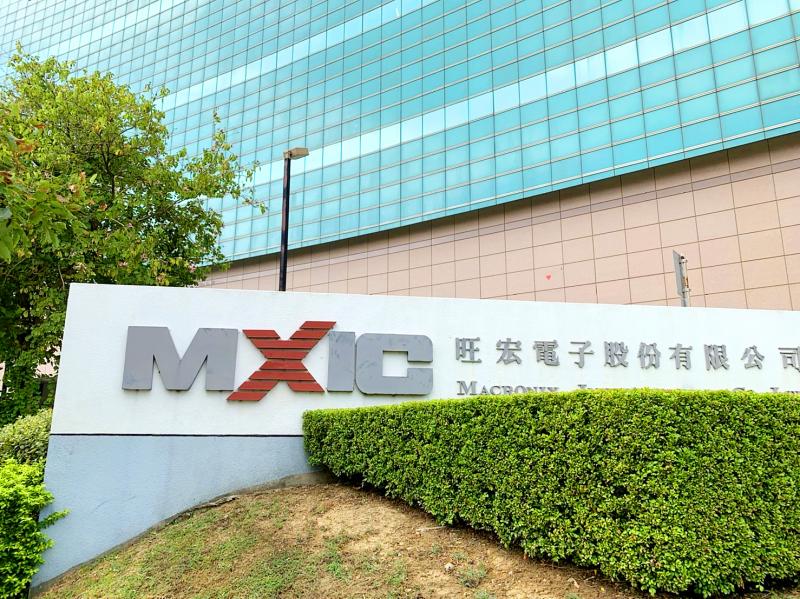Macronix International Co (旺宏電子), the world’s biggest supplier of NOR flash memory chips, yesterday posted its strongest first-quarter earnings as robust demand boosted chip prices and offset the effects of component shortages.
Macronix said it expects the upward trend in prices to continue this quarter, or be flat, given strong demand from customers.
COVID-19 lockdowns in China caused an uneven supply of key components, but that would not affect orders, the company said.

Photo: Grace Hung, Taipei Times
“China’s ‘zero COVID-19’ policy has affected its economic growth to some extent,” Macronix chairman Miin Wu (吳敏求) said during an online investors’ conference. “Low-end consumer electronics suffered the brunt, but that is not the market we are targeting.”
About 80 percent of its chips are used in non-consumer electronics and non-PC applications, Wu said, brushing off a major investment consulting company’s bearish view of Macronix’s business outlook.
While customers in China scaled back some orders due to the COVID-19 curbs, orders from Taiwan, the US, Japan and Europe all look brisk, he said.
In responding to an investor’s question about his comments on Chinese rival Yangtze Memory Technologies Co (長江存儲) winning orders from Apple Inc, Wu said Macronix is not interested in working with Apple, as it would not benefit his firm.
“We are targeting high-quality applications for our NAND flash memory chips, rather than the mass market,” Wu said.
Macronix produces mainly low-density NAND flash memory chips used in vehicles, industrial devices and 5G base stations, rather than high-density NAND flash chips for true wireless stereo, he said.
Net profit last quarter rose 220 percent to NT$2.93 billion (US$99.97 million) from NT$916 million a year earlier, but dropped 21 percent quarterly from NT$3.69 billion.
Macronix expects flash memory prices to be flat, or to climb further this quarter, it said.
Gross margin climbed to 48.3 percent last quarter, from 34.3 percent a year earlier and 47.2 percent the previous quarter.
Gross margin, excluding an inventory loss provision of NT$115 million, jumped 49.3 percent, it said.
This year, gross margin could be similar to last quarter, indicating an improvement from 41.6 percent last year, it said.
Macronix plans to spend NT$16 billion on new facilities and equipment this year.
The company’s new 5B Fab is expected to start cranking out a small volume of chips at the end of this year.
Macronix said it is working on a plan to increase its cash dividend distribution to about NT$2 per common share, as it is seeking a long-term, stable dividend policy.
The chipmaker plans to distribute NT$1.8 per common share, representing a payout ratio of 27.78 percent based on last year’s earnings per share of NT$6.48.

Intel Corp chief executive officer Lip-Bu Tan (陳立武) is expected to meet with Taiwanese suppliers next month in conjunction with the opening of the Computex Taipei trade show, supply chain sources said on Monday. The visit, the first for Tan to Taiwan since assuming his new post last month, would be aimed at enhancing Intel’s ties with suppliers in Taiwan as he attempts to help turn around the struggling US chipmaker, the sources said. Tan is to hold a banquet to celebrate Intel’s 40-year presence in Taiwan before Computex opens on May 20 and invite dozens of Taiwanese suppliers to exchange views

Application-specific integrated circuit designer Faraday Technology Corp (智原) yesterday said that although revenue this quarter would decline 30 percent from last quarter, it retained its full-year forecast of revenue growth of 100 percent. The company attributed the quarterly drop to a slowdown in customers’ production of chips using Faraday’s advanced packaging technology. The company is still confident about its revenue growth this year, given its strong “design-win” — or the projects it won to help customers design their chips, Faraday president Steve Wang (王國雍) told an online earnings conference. “The design-win this year is better than we expected. We believe we will win

Quanta Computer Inc (廣達) chairman Barry Lam (林百里) is expected to share his views about the artificial intelligence (AI) industry’s prospects during his speech at the company’s 37th anniversary ceremony, as AI servers have become a new growth engine for the equipment manufacturing service provider. Lam’s speech is much anticipated, as Quanta has risen as one of the world’s major AI server suppliers. The company reported a 30 percent year-on-year growth in consolidated revenue to NT$1.41 trillion (US$43.35 billion) last year, thanks to fast-growing demand for servers, especially those with AI capabilities. The company told investors in November last year that

Power supply and electronic components maker Delta Electronics Inc (台達電) yesterday said it plans to ship its new 1 megawatt charging systems for electric trucks and buses in the first half of next year at the earliest. The new charging piles, which deliver up to 1 megawatt of charging power, are designed for heavy-duty electric vehicles, and support a maximum current of 1,500 amperes and output of 1,250 volts, Delta said in a news release. “If everything goes smoothly, we could begin shipping those new charging systems as early as in the first half of next year,” a company official said. The new